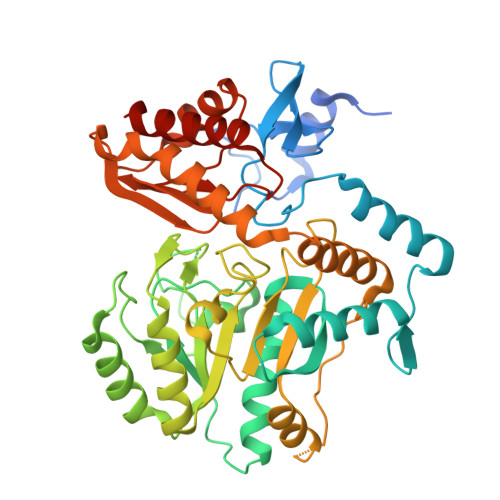Fragment-Based Exploration of Binding Site Flexibility in Mycobacterium tuberculosis BioA.
Dai, R., Geders, T.W., Liu, F., Park, S.W., Schnappinger, D., Aldrich, C.C., Finzel, B.C.(2015) J Med Chem 58: 5208-5217
- PubMed: 26068403
- DOI: https://doi.org/10.1021/acs.jmedchem.5b00092
- Primary Citation of Related Structures:
4WYA, 4WYC, 4WYD, 4WYE, 4WYF, 4WYG, 4XEW - PubMed Abstract:
The PLP-dependent transaminase (BioA) of Mycobacterium tuberculosis and other pathogens that catalyzes the second step of biotin biosynthesis is a now well-validated target for antibacterial development. Fragment screening by differential scanning fluorimetry has been performed to discover new chemical scaffolds and promote optimization of existing inhibitors. Calorimetry confirms binding of six molecules with high ligand efficiency. Thermodynamic data identifies which molecules bind with the enthalpy driven stabilization preferred in compounds that represent attractive starting points for future optimization. Crystallographic characterization of complexes with these molecules reveals the dynamic nature of the BioA active site. Different side chain conformational states are stabilized in response to binding by different molecules. A detailed analysis of conformational diversity in available BioA structures is presented, resulting in the identification of two states that might be targeted with molecular scaffolds incorporating well-defined conformational attributes. This new structural data can be used as part of a scaffold hopping strategy to further optimize existing inhibitors or create new small molecules with improved therapeutic potential.
- †Department of Medicinal Chemistry, University of Minnesota, 8-101 Weaver-Densford, 308 Harvard Street SE, Minneapolis, Minnesota 55455, United States.
Organizational Affiliation:


















